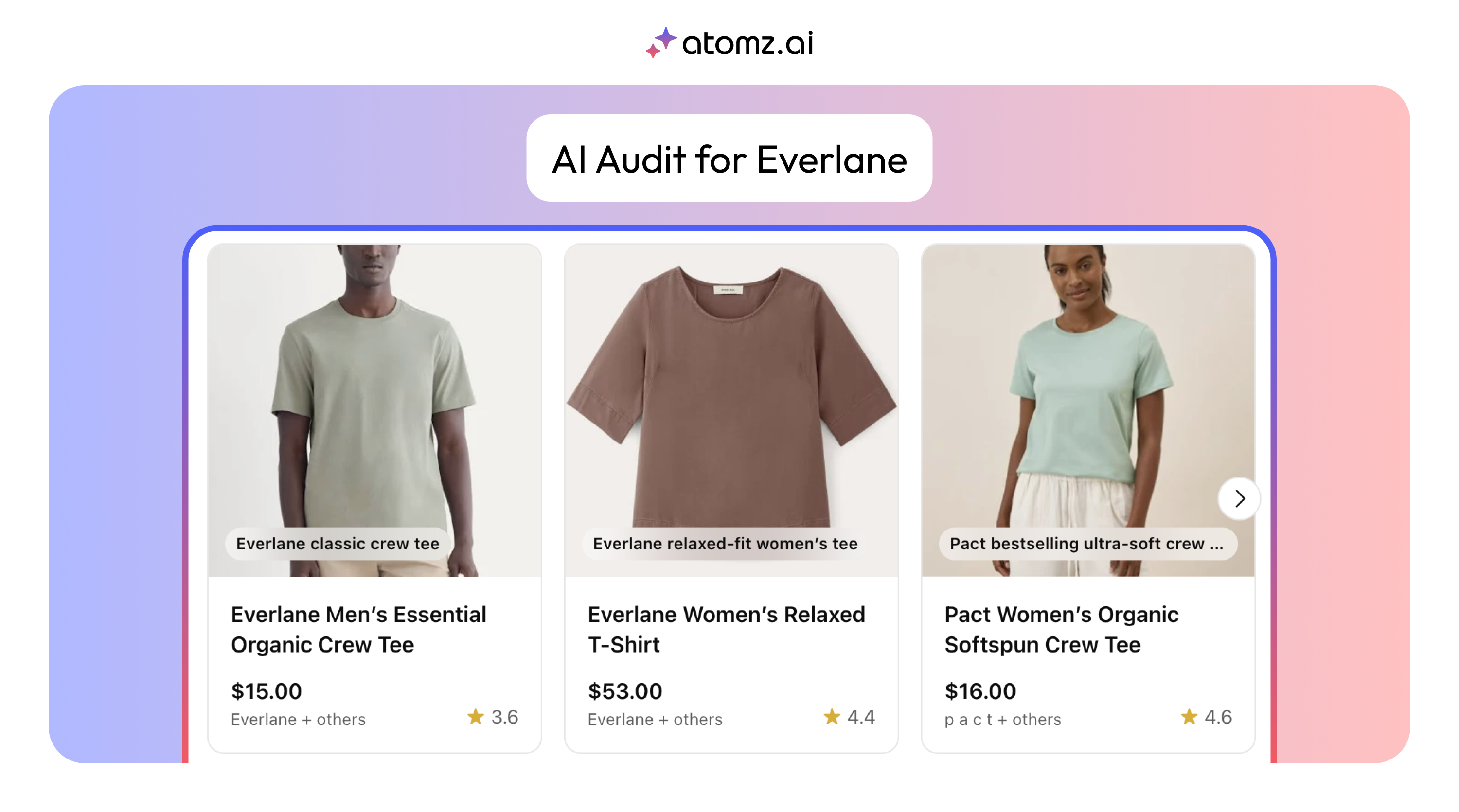
ON THIS PAGE
Stay Updated with latest in AI SEO
21 November 2025
Something caught my attention recently. More people are using ChatGPT to shop for products, but nobody's really testing how well-known brands actually show up in these AI-powered searches.
So I decided to run an experiment. I picked Everlane, a sustainable fashion brand that most people in retail know, and tested how visible they are when someone uses ChatGPT to find clothes.
Everlane appeared in only 4 out of 11 purchase scenarios I tested. Despite being a major player in sustainable fashion, they were completely absent from searches like buy sustainable clothing online.
Before diving into the Everlane results, you can check your brand's general AI readiness right now.
Test Your Brand's AI Visibility →
Takes 2 minutes. See how your brand performs across different AI systems.
Test how your brand performs across the complete AI discovery spectrum with these 11 strategic queries:
Tests: Do you own your product category in AI recommendations?
Tests: Does AI recommend you for specific product attributes?
Tests: Do you appear when customers describe their needs?
Tests: How does AI categorize your unique value props?
Tests: Do you capture purchase-ready shoppers with buying signals?
4 out of 11 queries (36% visibility)
Scoring approach: 8+ mentions = strong visibility | 4-7 = mixed results | under 4 = limited visibility
Here's what happened with each search:
Result:
Missing entirely
What appeared instead:
PACT Organic Softspun Crew-Neck Tee ($16), Les Fleurs Organic Cotton Midi Dress ($54), Trendsplant Organic T-Shirt ($33)
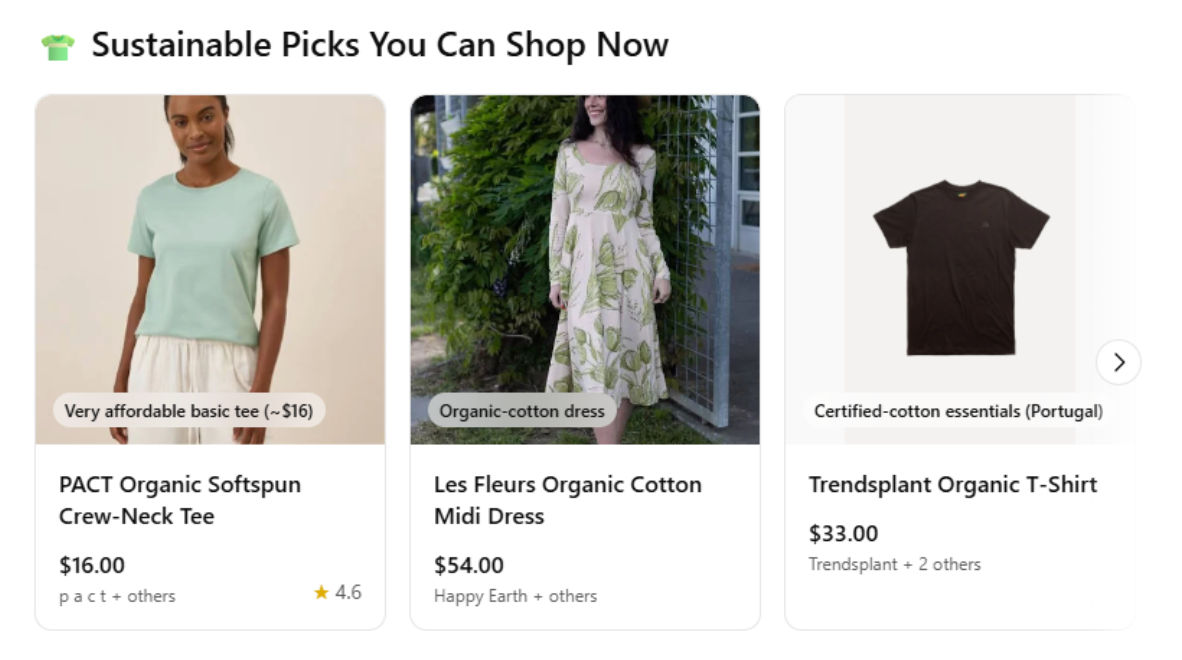
My take:
This one surprised me. Everlane is synonymous with sustainable fashion, yet they don't show up in this core category search.
Result:
Missing entirely
What appeared instead:
PACT Organic Crew-Neck Tee ($16), PACT Organic Fit-and-Flare Midi Dress ($40), Fair Indigo Organic Cotton Crew-Neck Tee ($36.90)
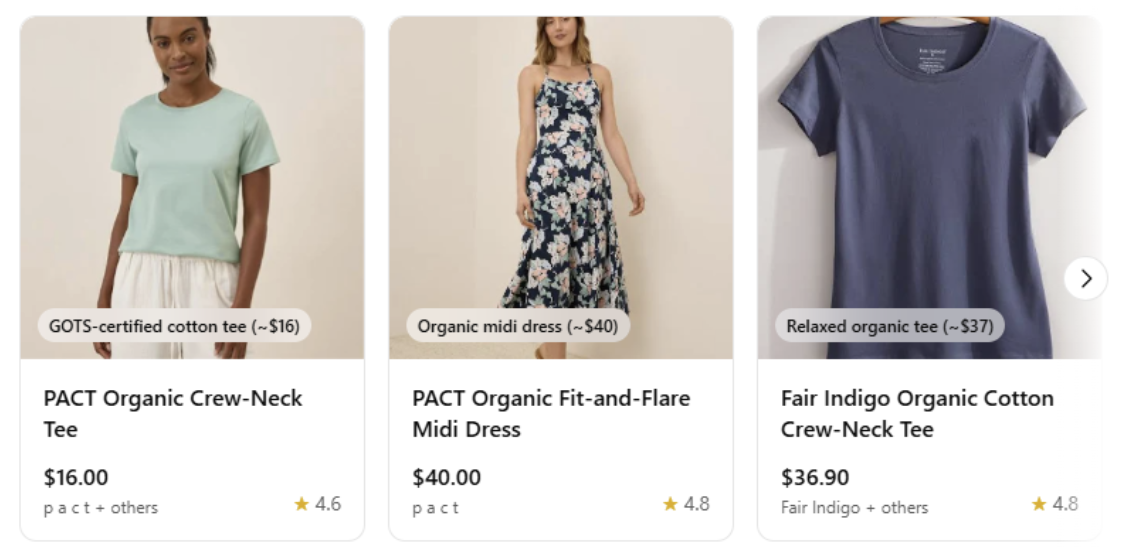
My take:
PACT appears twice here. They seem to own the organic cotton space in AI search results.
Result:
Missing entirely
What appeared instead:
PACT Organic Cotton Crew-Neck Tee ($16), Organic Basics True Regular Tee ($23.10), Fair Indigo Organic Cotton Tank Top ($39.90)
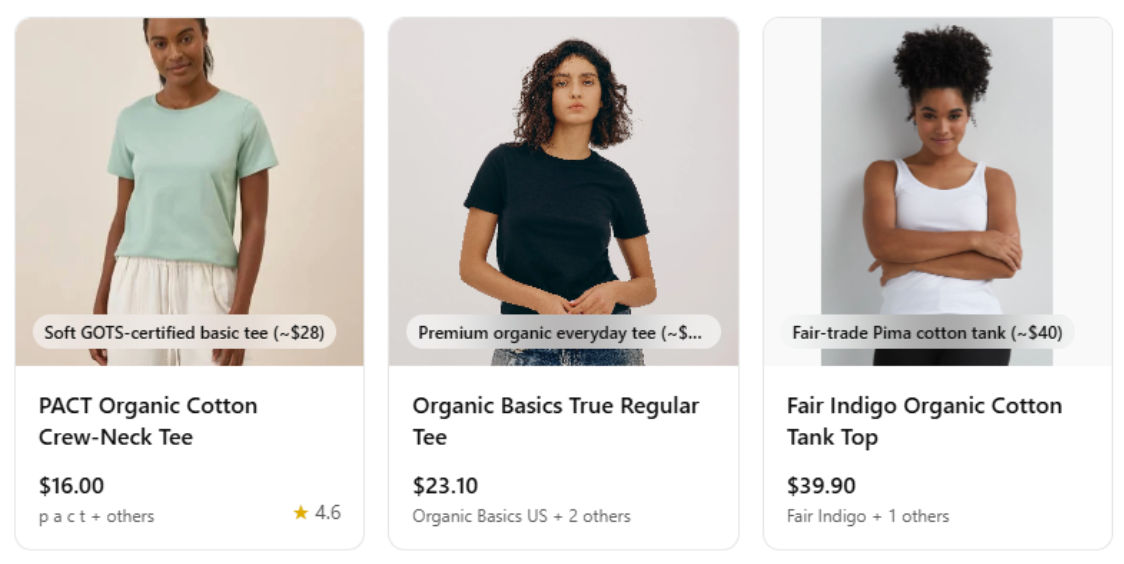
My take:
Even for basics, which Everlane is known for, they're absent. Organic Basics and PACT dominate instead.
Result:
Missing entirely
What appeared instead:
Similar focus on PACT and other affordable ethical brands
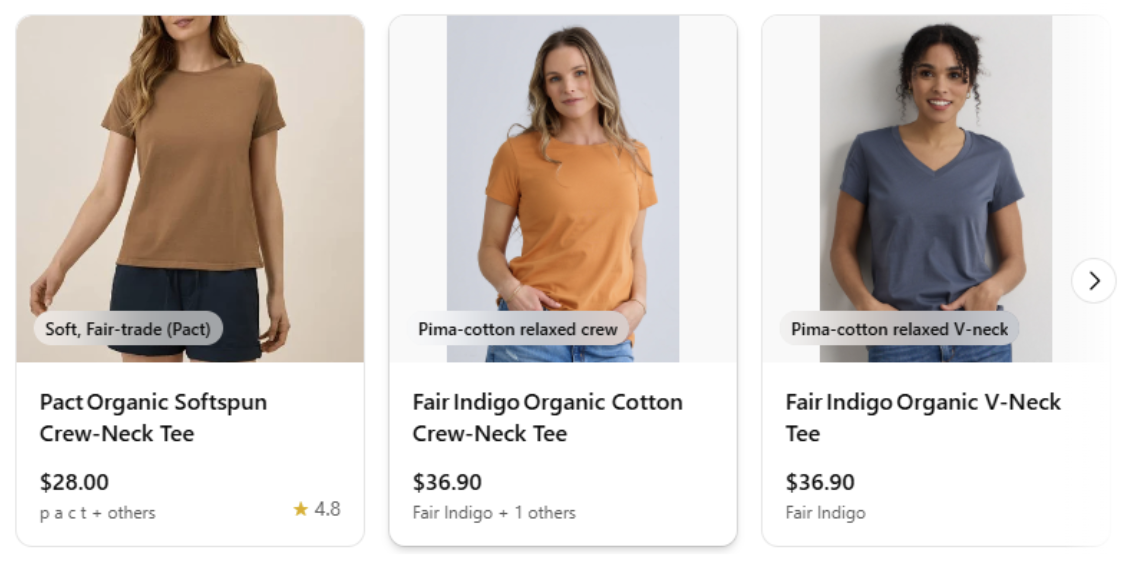
My take:
Price-conscious ethical searches favor brands positioned specifically around affordability.
Result:
Featured prominently
What appeared:
Everlane Washable Silk Notch Shirt ($53) with label highlighting transparent pricing & factory info, plus Organic Basics Flex Tee ($24.50)
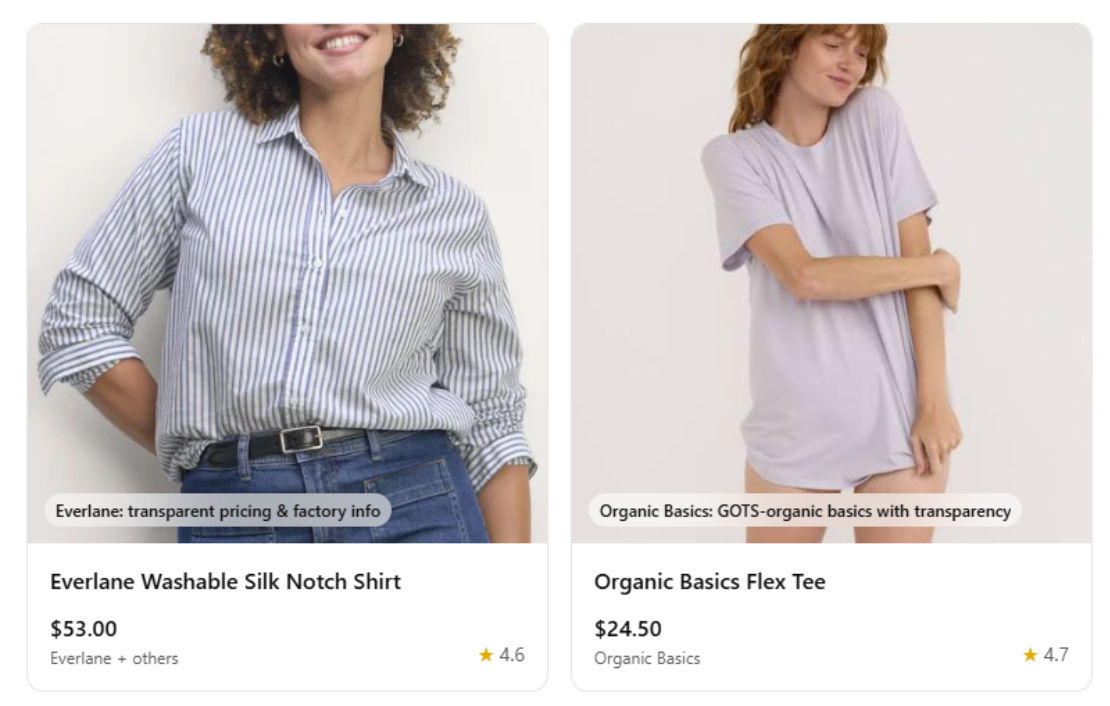
My take:
This makes sense. Transparency is Everlane's core differentiator, so they show up when that's the focus.
Result:
Featured in text list
What appeared:
Detailed list including Everlane: Transparent pricing, clean designs, sustainability-driven fabrics, and a capsule-friendly mix of tailoring and basics
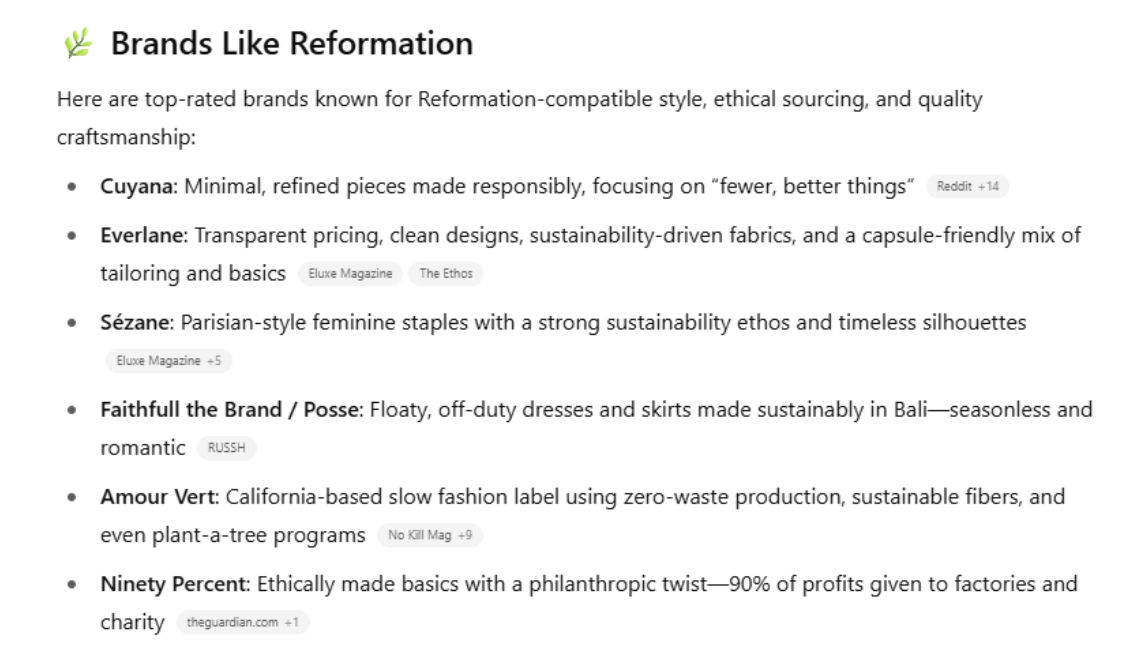
My take:
Strong competitive positioning. ChatGPT clearly understands Everlane as a viable Reformation alternative.
Result:
Featured prominently
What appeared:
Everlane Oversized Buttersmooth Blazer ($146), PACT Organic Cotton Relaxed Blazer ($35), Toad&Co Earthworks Pant ($95)
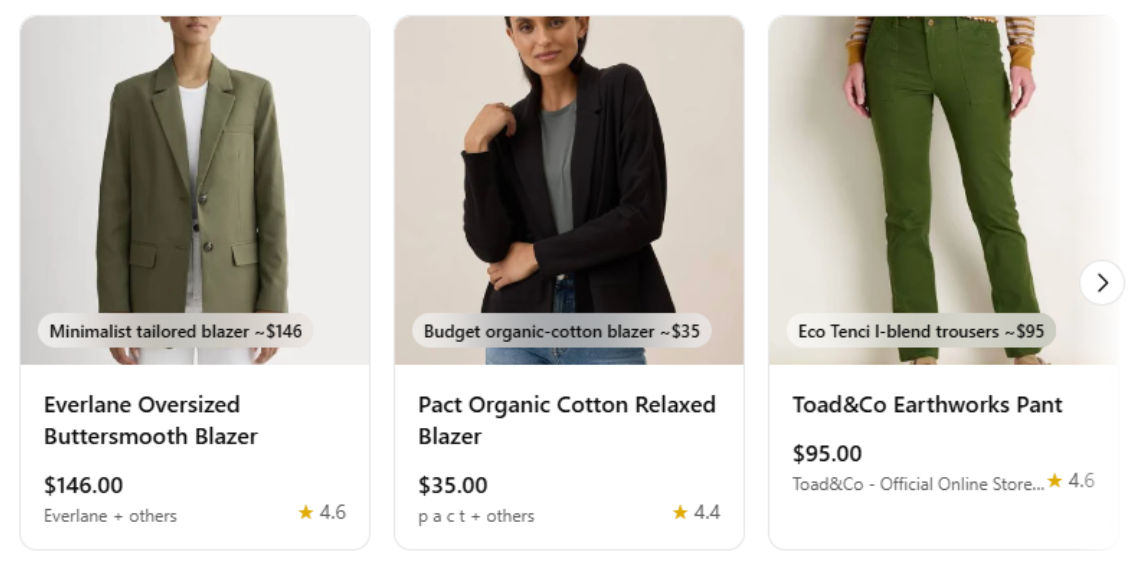
My take:
Everlane appears when the search combines professional context with their aesthetic strengths.
Result:
Featured twice
What appeared:
Everlane Cotton-Linen Blazer ($81.99), Eileen Fisher Linen Ankle Pants ($149), Everlane '80s Blazer ($81.99)
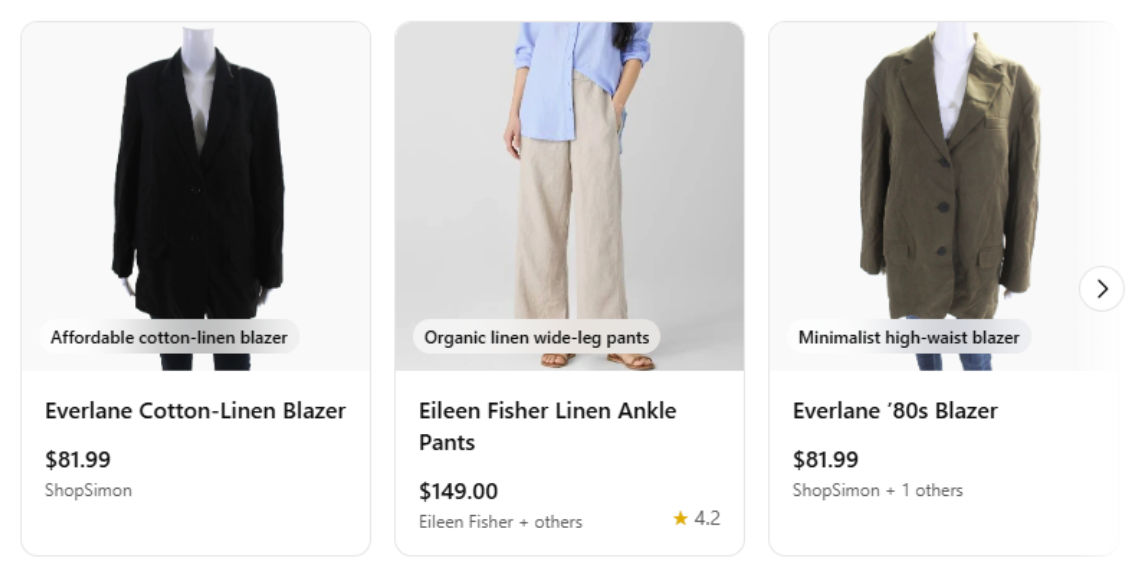
My take:
When style (minimalist) meets use case (workwear), Everlane dominates. This aligns perfectly with their brand positioning.
Result:
Missing entirely
What appeared:
NAADAM Women's Original Cashmere Sweater ($98), NAADAM Women's Original Cashmere Sweater ($98), James Perse Recycled Cashmere Crewneck Sweater ($256)
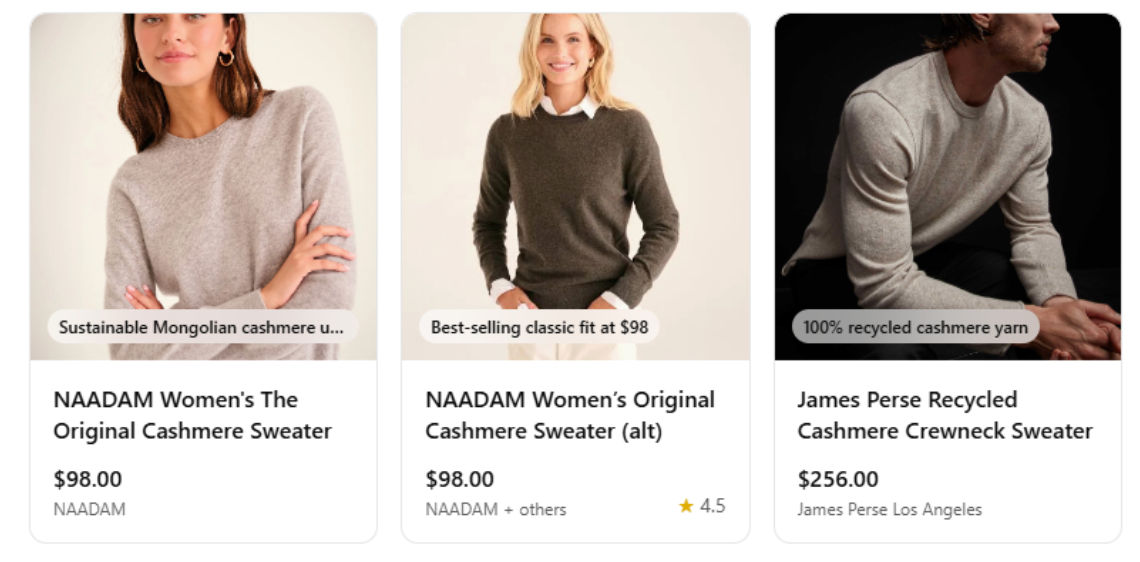
My take:
This one really surprised me. Everlane is famous for $50 cashmere, yet NAADAM dominates this search.
Result:
Missing entirely
What appeared:
Yes Friends Organic Cotton Tee ($16), Terra Thread Organic Tee ($14.97), NeedEssentials Organic Cotton Tee ($25)
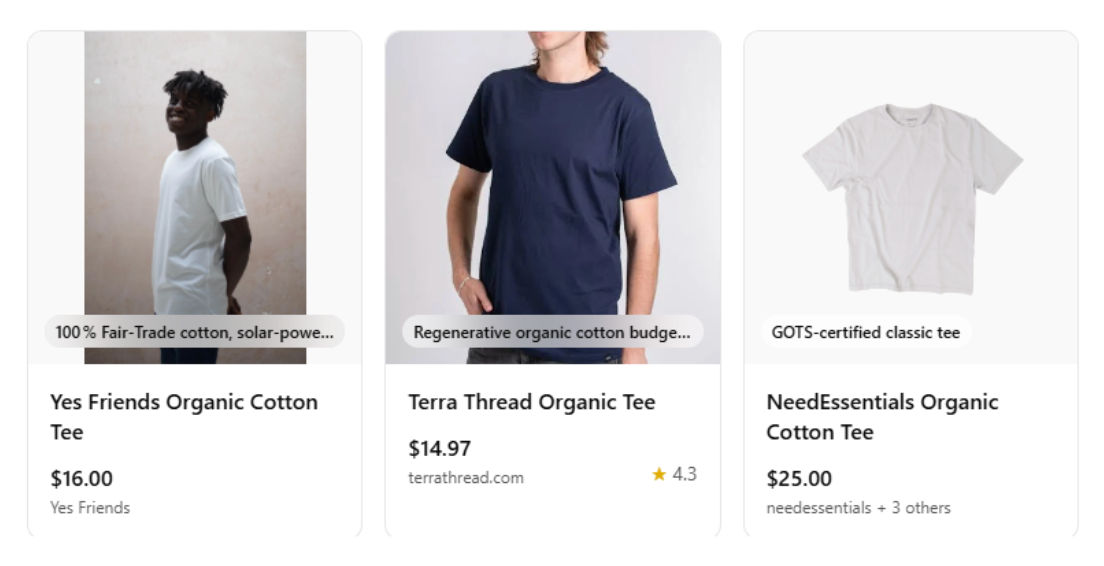
My take:
Despite offering free shipping on sustainable clothes, Everlane doesn't appear when both benefits are searched together.
Result:
Missing entirely
What appeared:
PACT Organic Cotton Soft-spun Tee ($16), Organic Basics True Regular Tee ($23.10), Organic Basics Flex Tee ($31)
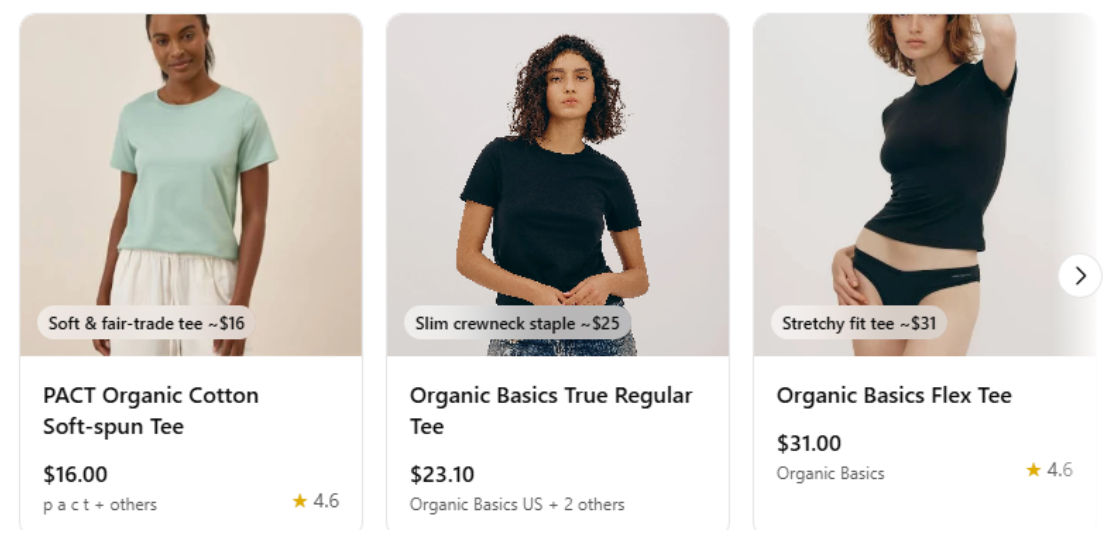
My take:
The word affordable seems to trigger AI toward specific budget-focused brands.
The standout finding: PACT appeared in 6+ different search results across multiple categories, while Everlane appeared in only 4.
Why this might be happening: Brands that appear consistently likely have more structured product data that AI systems can easily categorize. PACT's repeated presence suggests their product information is optimized for AI discovery with clear material descriptions, consistent categorization, and structured data that ChatGPT can readily access.
Working theory: It's not about brand size or recognition. It's about having discoverable product data.
The specialization trade-off: Everlane excels when searches align with their specific positioning (transparency, minimalist workwear, Reformation alternatives) but struggles with broader category discovery.
Category performance breakdown:
The PACT factor: This smaller brand appeared across sustainable clothing, organic cotton, women's basics, and affordable organic searches. Their consistent presence suggests ChatGPT strongly associates them with these categories.
Seeing similar patterns in your industry? Don't guess about your AI visibility.
Check Your Brand's AI Readiness →
See how your brand performs across multiple AI systems. Then manually test the 11-query framework above.
For sustainable brands: Having sustainable in your positioning doesn't guarantee visibility in sustainability searches. You need structured product data that clearly communicates materials, certifications, and category positioning to AI systems.
For established brands: Brand recognition and awareness don't automatically translate to AI discovery. Smaller brands with clearer category positioning might outperform you in AI-powered shopping scenarios.
The catalog factor: Brands that invest in detailed product catalogs with structured data (materials, certifications, clear categorization) appear to have significant advantages in AI discovery over those focusing primarily on brand messaging.
Check your brand's baseline AI visibility. Start here →
Which categories are you missing from? Where do competitors appear instead of you?
Optimize your product information for AI systems. Try our catalog tool →
Re-run tests monthly to track improvement and catch new patterns.
Based on this research, I've built several tools to help brands optimize for AI discovery:
• AI Readiness Scanner → Test your brand across multiple AI systems
• LLMs.txt Generator → Help AI systems understand your products
• Catalog Genius → Structure product data for better discovery
• AI Search Demo → See intelligent product discovery in action
Want your brand tested?
I'm building a research database of how brands appear in AI discovery systems.
Suggest a brand for analysis →
Testing method:
Fresh ChatGPT-4 sessions, purchase-intent queries, conducted August 3, 2025. This analysis examines publicly available AI responses for research purposes.
Study limitations:
Single AI platform (ChatGPT-4), point-in-time snapshot, purchase-intent queries only. Results may vary across different AI systems and time periods.
Tools used: AI readiness scanner, LLMs.txt generator, and catalog optimization agent for analyzing brand discoverability patterns.
© 2025 AI Brand Intelligence by Atomz. Forward freely, just keep this notice intact.
Streamline your workflow, achieve more
Richard Thomas
Create buying intent instantly
Create buying intent before customers search. 25%+ conversion lift guaranteed.
Why Prompts Matter
AI Search That Converts 3x Better
Get the latest in AI-powered search, UX trends, and eCommerce conversions—straight to your inbo
No spam. Just powerful insights.
👉 Join thousands of growth-focused brands.

